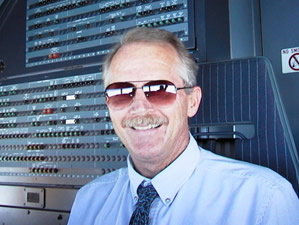
Ask Cognitive Science Professor Edwin Hutchins about his research and he starts to talk about some of the work he’s done over the years: living in the Trobriand Islands off the coast of Papua New Guinea; studying radar navigation, steam propulsion and bridge navigation aboard U.S. Navy ships; and learning to fly planes so he could better understand aviation safety and the needs of pilots.
When told that learning to fly planes doesn’t exactly sound like “work,” Hutchins laughs and says: “There’s no limit to the amount of fun I’m willing to have in the name of science.”
Obviously.
Hutchins sense of adventure goes back to his early days growing up in San Diego where he surfed and learned to navigate boats in the coastal waters of Southern California. He studied Anthropology as an undergraduate and graduate student at UC San Diego, eventually earning his Ph.D. in the subject, but also became interested in the field of Cognitive Science, the interdisciplinary study of the mind and intelligence that draws on philosophy, psychology, artificial intelligence, neuroscience, linguistics and anthropology. This interest led to his research in the Trobriand Islands where he studied how people reasoned in public. “It was my first big adventure in studying Cognitive Science in the real world,” he recalls.
After completing post doc work at the Institute for Cognitive Science at UCSD, Hutchins began working for the U.S. Navy Personnel Research and Development Center in the early 1980s where he conducted field research on radar navigation and steam propulsion. His work, along with the work of UCSD Cognitive Scientists James Hollan and Donald Norman, helped the Navy improve their radar navigation training program. Tired of the dark, interior spaces his radar and steam propulsion research kept him in, however, Hutchins turned his attention back to navigation.
“As a navigator myself, I was interested in how navigation was conducted on the bridge of Navy ships,” he says. “So, I went to sea on a series of ships studying bridge navigation.” Years later, he turned his work in this area into the groundbreaking book, Cognition in the Wild, which was his attempt to show that human cognition is not just influenced by culture and society, but that it is in a very fundamental sense a cultural and social process.
His work with the Navy kept him in contact with the UCSD faculty and campus, but it wasn’t until after he won a MacArthur fellowship—or “genius” award—and left the Navy that he finally joined the university in 1988 as a member of the newly-established Cognitive Science Department. It was around this time that Hutchins also switched his research focus to aviation after he and Donald Norman received a grant from NASA to study aviation safety.
“What this really meant is that I would be spending a lot of time in cockpits and talking to pilots,” he says. “It also meant that I had to learn how to fly, which I was happy to do.”
Since then, Hutchins has been studying cognition in commercial aviation flight decks as well as private corporate jets. His recent work with Boeing focuses on the roles of language and culture in the flight deck operations of airlines based outside the U.S., and has taken him to Brazil, Australia, New Zealand and Japan.
“The nature of language practices in commercial aviation is a big issue,” he says. “Our reports highlight things not seen in North America, and that Boeing engineers wouldn’t know to plan for. The information we collect is of good value and can help address some of the language challenges.”
In addition to his work in aviation safety, Hutchins also co-directs the Distributed Cognition and Human-Computer Interaction Laboratory with James Hollan. Their research ranges across cognitive science, but with a particular focus on understanding interactions among people and technology.
“Our core research is directed at understanding work environments in which people pursue their goals in collaboration with the elements of the social and material world,” he says. “We ask questions such as ‘what do we really do in these environments, how do we coordinate our activity in them, and what role should technology play in them?’ Through our work, we are trying to challenge current views.”
That challenge is one of the many things that keeps Hutchins excited about working and teaching in the field:
“I’m as excited now as I’ve ever been,” he says. “The field of Cognitive Science is in motion, and I see a lot of things happening. I just keep trying to nudge the field in a productive direction.”
|